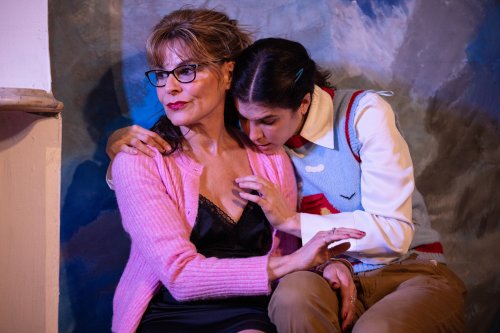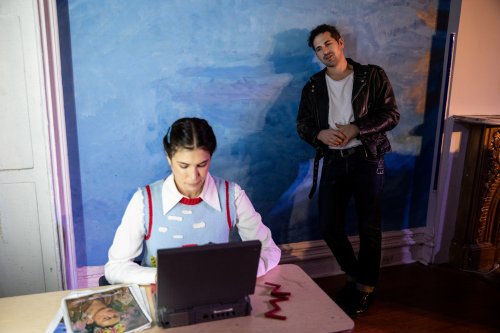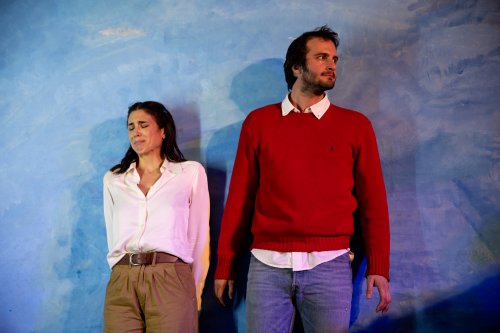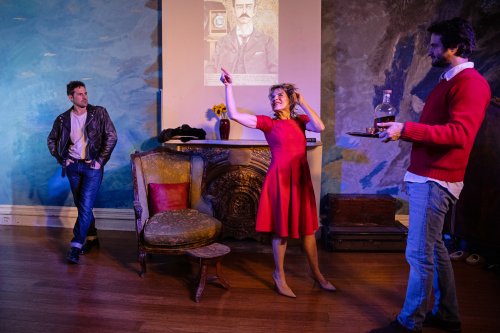The Whole of Time
American premiere of Romina Paula's prize-winning play which is an Argentinian variation on Tennessee Williams' "The Glass Menagerie."

Ana B. Gabriel and Josefina Scaro in a scene from the Tony Torn production of Romina Paula’s “The Whole of Time” at Torn Page (Photo credit: Maria Baranova)
[avatar user=”Victor Gluck” size=”96″ align=”left”] Victor Gluck, Editor-in-Chief[/avatar]
There are three reasons for seeing the American premiere of Argentinian playwright/novelist/filmmaker Romina Paula’s The Whole of Time: the play is a South American version of Tennessee Williams’ The Glass Menagerie, it gives insights into the current theater of Argentina, and as it is performed in an intimate space that seats only 22 audience members per night, it is a highly unusual theatrical experience. However, Tony Torn’s animated and passionate production does not explain all of the play’s mysteries like the meaning of the title nor does the acting style of the four actors seem to be on the same page.
Like Williams’ play, the mother, brother and sister in The Whole of Time comprise a dysfunctional family here living in contemporary Buenos Aires: sister Antonia hasn’t gone out for years (though we do not know why), brother Lorenzo can’t wait to escape to Spain, and mother Ursula who lives in her past from her childhood in Hungary and has high hopes for her children. When Lorenzo brings home a friend Maximiliano, the bartender from the Grill in which he works as a waiter, to meet his sister, Maxi and Antonia are attracted to each other though it is obvious the family is much more intellectual than the uneducated bartender. This short play ends abruptly and has an open ending for all of the characters, unlike the way Williams ended his play by tying up all the loose ends.

Josefina Scaro and Ben Becher in a scene from the Tony Torn production of Romina Paula’s “The Whole of Time” at Torn Page (Photo credit: Maria Baranova)
Aside from the title not being explained, the Jean Graham-Jones translation seems to end very abruptly. Nothing is settled at the end of its short running time and it certainly feels like more is to come, unlike Williams’ play. There are also too many unanswered questions like what does Ursula do that supports the family of three, why has Lorenzo chosen Spain to move to, what event caused Antonia to stop going out, what is the relationship between Lorenzo and Maximiliano, etc. While Ursula is proud of her Hungarian and Mexican heritage we don’t learn much about it. The Whole of Time plays like a sketch of a play that hasn’t been written or that need a second act to deal with all the loose ends.
While Torn’s direction keeps the play moving swiftly along, the performers seem to be using different acting styles rather than being on the same page. Unaccountably, the actors have various accents which do not sound like they are in the same family. The script’s gaps and holes give the actors less to work with than they need to create fully rounded performances. Whether this is typical of Argentinian theater or Romina Paula’s work, needs to be further investigated. At times, the play suggests French Theater of the Absurd where things happen or are discussed for no particular reason and character motivation may go unexplained.

Josefina Scaro and Lucas Salvagno in a scene from the Tony Torn production of Romina Paula’s “The Whole of Time” at Torn Page (Photo credit: Maria Baranova)
The actors are all immersed in their roles though they seem to know more that the play tells the audience. As Antonia, the agoraphobic sister, Josefina Scaro who has performed in Argentina seems to have a different rhythm than the other actors though she establishes that she is an enigma that won’t be solved. The production has Lucas Salvagno as brother Lorenzo sing the Mexican song referred to in the play both at the beginning and the end while the script only lists a recording. His Lorenzo is as distant as his sister as he spends a great deal of time reading Moby Dick though we never know if he is also a student.
Ana B. Gabriel as the mother Ursula is also rather cryptic: in the first half of the play she seems very maternal, but after she returns from a dinner date with smudged lipstick she seems extremely flirtatious though she may have been drinking at dinner. As Maximiliano dressed in a leather jacket, white tee shirt and blue jeans, Ben Becher seems to have taken Marlon Brando in A Streetcar Named Desire and The Wild One as his model (though without the mumbled speech) but he establishes quickly on that he is from a different class as he is confused by the family’s references to music and authors. His performance lacks the subtext which would explain where he is coming from. He does, however, make Maxi somewhat sinister and we never know what he is capable of.

Ben Becher, Ana B. Gabriel and Lucas Salvagno in a scene from the Tony Torn production of Romina Paula’s “The Whole of Time” at Torn Page (Photo credit: Maria Baranova)
The ambiguous production design includes Frieda Kahlo paintings in Torn’s video and two different blue murals by Donald Gallagher on either side of the fireplace. The uncredited set includes a desk and a laptop, a make-up table, a clothes closet and an armchair suggesting that the intimate playing space is meant as a bedroom. The lighting by Jay Ryan is suitable without adding anything to the play. The sound design also by Torn includes the periodic music played on and off through the evening including Mexican singer-songwriter Marco Antonio Solis’ “Sí no te hubieros ido” which holds an important meaning in the text.
Romina Paula’s The Whole of Time which won the 2020 Florencio Sánchez Prize for Best Argentinian Play is very different from her Fauna produced at Torn Page in the fall of 2022 which included the staging of an unproduced screenplay and the life of a famous poet who had just died. The Whole of Time is intriguing, partly for being so mysterious and partly for using French absurdist techniques. Ultimately, this rare play to reach our shores from Argentina is unsatisfactory as it feels unfinished or undeveloped.
The Whole of Time (extended through February 11, 2024)
Joben Studios, developed in association with *Necessary Digression in collaboration with The Martin E. Segal Center for Theatre Research
Torn Page, 435 W. 22nd Street, in Manhattan
For tickets, visit http://www.tornpage.org
Running time: one hour and 15 minutes with no intermission






Leave a comment